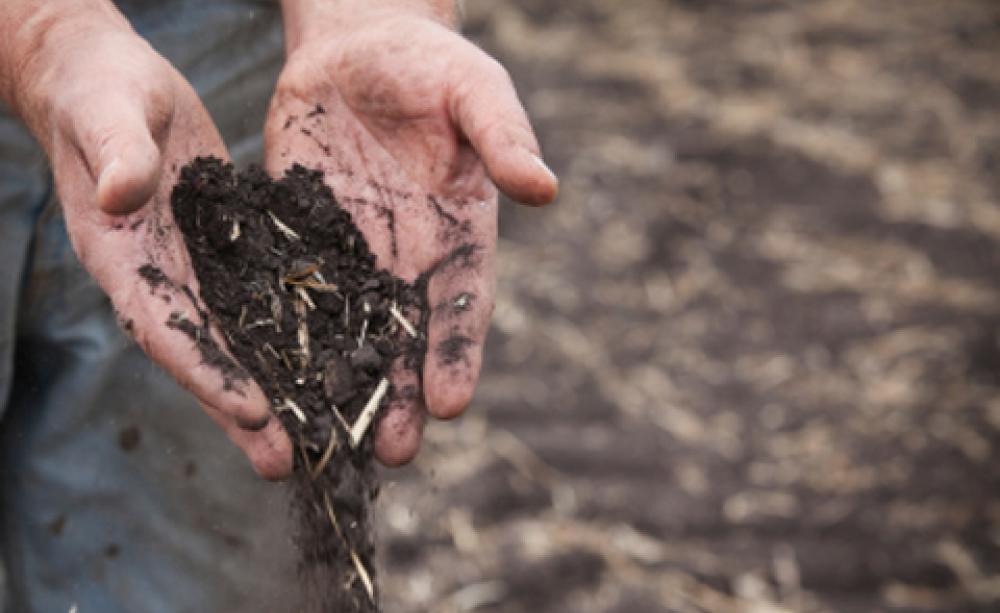The UK’s soils are in a parlous state.
Look at the shopping section of your search engine of choice, and you’ll find lots of offerings of soil: £73 a 0.6 cubic metre bag for “economy screened topsoil (not suitable for planting and seeding)”; £2 for 25 litres of “multipurpose topsoil for beds, borders and lawn preparation”. Even 10L of “powerful cultivation substrate for all kinds of pond plants”, 10 percent off at £7.99.
What a shopping website can’t tell you is that soil is - literally - priceless. We can’t live without it. It supports the plants that produce the oxygen we breathe, and sops up a lot, if not enough, of the carbon dioxide our societies have released from the Earth’s carbon store.
It produces the food we eat. It is the basis for ecosystems on the 30 percent of the planet’s surface that is land, on which our economies are entirely, completely dependent.
Fungi
That’s why it will be a big topic of conversation at the COP26 climate talks in Glasgow. But before we get to that, in Westminster, the Environment Bill is a key focus of attention.
For the UK’s soils are in a parlous state. We lose more than three million tonnes of topsoil every year, with 16 percent of arable land losing it so fast it is likely to become unproductive.
Four million tonnes are at risk of compaction - the air and structure squeezed out of them, mostly by endless passes of heavy machinery. And we’re just beginning to grasp how much microplastics are woven through every piece of our land, with largely unknown, but certainly deleterious, effects.
The UK’s soils are in a parlous state.
Then there’s the state of the life of our soils: the earthworms that so fascinated Charles Darwin, who understood how crucial their biological role is, the amazingly tough tardigrades and springtails, the countless, many unidentified bacteria and fungi that should in a healthy soil together tally a billion organisms in a teaspoon.
We know that pesticides and artificial fertilisers have put them in a bad way. How bad, like the state of more commonly covered insectageddon, we’ve only a scant idea.
Targets
The UK Government accepts the state of our soils is a huge issue. As Baroness Young of Old Scone handily counted for the House of Lords debate on the Environment Bill, the term “soil quality” is used 17 times in the 25 Year Plan for the Environment that is supposed to be the government’s overarching policy.
It includes the commitment that England’s soils will be sustainably managed by 2030. Yet, when the Environment Bill came to the House, it included a legal commitment for priority targets for air and water quality, but not soils.
One of the government’s arguments for that lack is that we don’t have enough information to set a target. There’s a reason for that ignorance. Only around 0.4 percent of England’s environmental monitoring budget is spent on soil.
And its lack of grasp - and focus - on the issue was evident in its response to my addition to the Bill: that as well as looking after air and water, soils would be sorted too. That’s making soil a second-order issue, when it clearly needs to be at the top of the agenda.
After a lot of pressure from all sides of the House, we have seen some progress, at least in terms of words around the Bill. We’re promised a soil action plan, there’s talk of soil targets coming some time in the future - but not now, and not in law - rather than words in Hansard that can be ignored or dodged around.
Polluted
A lot of the government’s arguments come down to “we don’t have enough information so can’t do it”, but the Sustainable Soils Alliance, a much-respected umbrella expert group, says it could be possible to have a target specifically for soil structure using data from the soil structure scheme. This target can then be developed, evolved and finessed over time.
So today, I’ll be trying again, as the House of Lords considers the Commons reasons for refusing to accept nearly all of its carefully considered, expertly shaped amendments.
There’s a huge number of important amendments - you’ve probably seen the way media sources from the Daily Mail to the Guardian have been scathing about its refusal to acknowledge the need to force privatised water companies to clean up their act - and also crucial is making the Office of Environmental Protection a truly independent body able to hold the government to account.
But I’m not going to let soils remain a second-class issue without a fight. The Bill will be profoundly defective without a legal commitment to a priority soil target in it.
The government will say “but we have to get this through before COP26 starts”. But the Environment Bill is not just for COP, but for the treatment of our much-abused, disastrously nature-depleted, plastic-choked, polluted islands. Getting it right is far more important than getting it fast.
This Author
Natalie Bennett is a member of the House of Lords, and a member of the Green Party.







